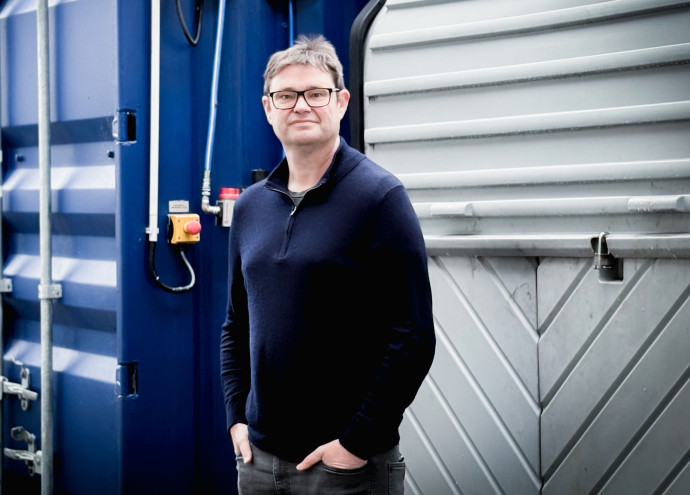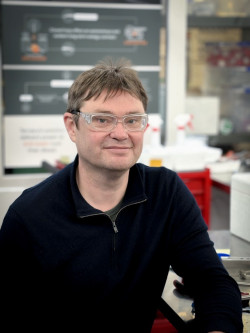2025 Pickering Medal: Reimagining materials and energy for sustainability

Professor Aaron Marshall, of Te Whare Wānanga o Waitaha – the University of Canterbury and the MacDiarmid Institute, has been awarded the Pickering Medal for pioneering research in electrochemistry and for successfully commercialising sustainable technologies.
Electrochemistry uses electricity to control or drive chemical reactions at the surface of electrodes. Aaron uses a mix of fundamental research, thermodynamic modelling and engineering know-how to identify the optimal conditions to minimise emissions and operating costs of industrial electrochemistry. Aaron has focused his efforts on high-value problems with commercially viable solutions, and has founded two spin-out companies that are each valued at tens of millions of dollars.
Zincovery offers the world’s first low-carbon pure zinc, recycled from steel-industry waste. The company's innovative technology separates the zinc from the toxic waste, generating 95% less emissions with 45% lower operating costs than the conventional process. Zincovery is building a facility in New Zealand to produce ultra-high purity zinc.
Ternary aims to enable zero-emission transport by using a novel liquid that effectively stores electricity. Importantly the liquid can be stored and delivered using existing fuel infrastructure, then recharged after use, creating a completely circular renewable energy system. Aaron conceived the electrocatalytic pathway to efficiently harness energy from the liquid feedstock.
“Electrochemistry lets us reimagine materials and energy in ways that avoid waste and create whole new industries,” Aaron says.
When Aaron started his career in electrochemistry, he was focused on fundamental science.
“What I’ve now discovered is a lot of that fundamental science can be used to create really good commercial opportunities.”
“Some of the breakthroughs came from simple ideas that others overlooked – moments when obvious insights turned out to be game-changers.”
“But I also learned that even good ideas don’t matter unless markets value them, so resilience and adaptability are key.”

His first spin-out, Zincovery, recycles zinc from industrial waste. When steel is recycled, the zinc is vaporised off and collected as dust. Aaron developed a process to extract zinc from this dust.
“For Zincovery, the spark was realising that the zinc locked in steel-making waste could be recovered if I could solve the zinc–iron separation problem. By treating it as a thermodynamic puzzle rather than trial and error, I found a new pathway.”
The new process generates substantially less emissions and is cheaper to run than the conventional process. The company has already secured buyers for the ultra-high-purity zinc the New Zealand facility will produce.
“In 20 years, I hope zinc is no longer mined at all – it will be recovered and reused, with other metals following the same path.”
His second spin-out, Ternary, is focused on finding alternatives to battery electric or hydrogen-powered vehicles to enable sustainable transport.
Aaron sought to solve the challenge of storing hydrogen and transporting it around the place.
“It was clear that battery electric or hydrogen’s infrastructure problems made progress impossible – so I set out to create a liquid energy-carrier that could flow through existing diesel systems.”
"Our key discovery at Ternary is that we could use a liquid to transport hydrogen from one place to another. The good thing is, we put that liquid on the vehicle just like conventional fuel and we extract hydrogen from it to drive the vehicle in a sustainable way. The emissions are just water,” Aaron says.
“Essentially, we use the liquid to transport energy from a location with low-cost renewable electricity to the point of use, including powering heavy trucks and construction equipment.”
Aaron’s vision is for conventional fuels like diesel to no longer be used in 20 years and for the world to be powered on renewable electricity.
“I think it’s super exciting that we’ve developed this technology in New Zealand, there’s a massive global opportunity, and more importantly there’s lots of people interested in using our technology.”
Matt Hobbs, a senior commercialisation advisor at Te Whare Wānanga o Waitaha – the University of Canterbury, supports Aaron to commercialise his research.
He says that Aaron’s “fail fast” approach of seeking to solve industry problems, but moving on quickly to the next issue if no solution can be found has built momentum for the engineering department.
“We have an active pipeline of students feeding through from undergraduate to post-docs, who also get exposed to these amazing spin-out companies that Aaron's formed here on campus! It’s a great way to see the genuine impact from his research that he's done here at the University of Canterbury.”
“The knock-on effect from what Aaron does – for the university, and for New Zealand's economy – is profound,” Matt says.
In receiving this award, Aaron says: “I’m grateful to the University of Canterbury, the MacDiarmid Institute, KiwiNet, my co-founders Jono Ring, Sean Molloy, and Sean Simpson, and the investors who trusted us. And, of course, my family, who don’t mind listening to my crazy ideas, and who put up with my busy schedule.”
“It is recognition that mixing deep science with commercialisation can create real impact.”
“New Zealand can contribute by backing bold, fundamental science while also having the structures that let scientists seize commercial opportunities.”
“I think the future’s really bright when we can take fundamental science and combine it with technologies, like electrical engineering, to solve real-world problems.”
Pickering Medal:
For innovation and excellence in technology that has generated significant impact and commercial success both nationally and internationally.
Citation:
To Aaron Marshall for pioneering electrochemistry research and successful commercialisation that have significantly advanced sustainable technologies.
